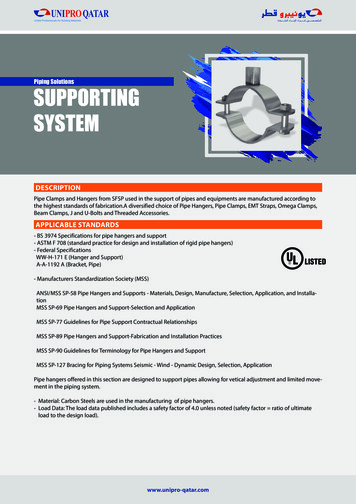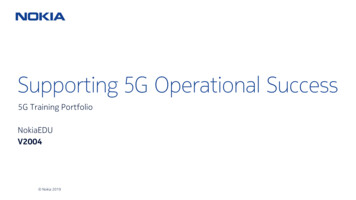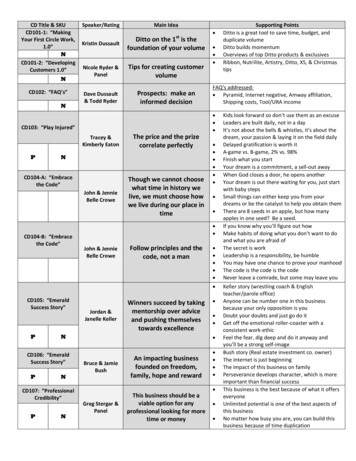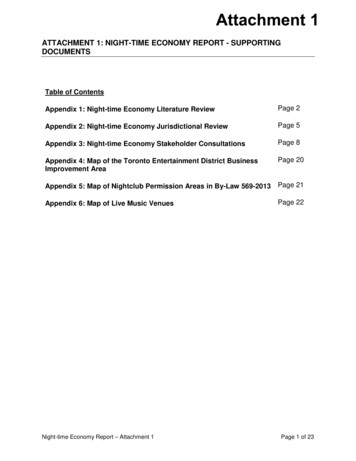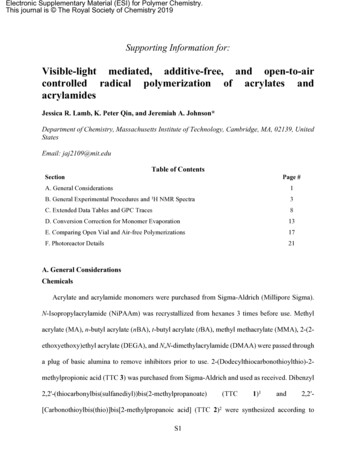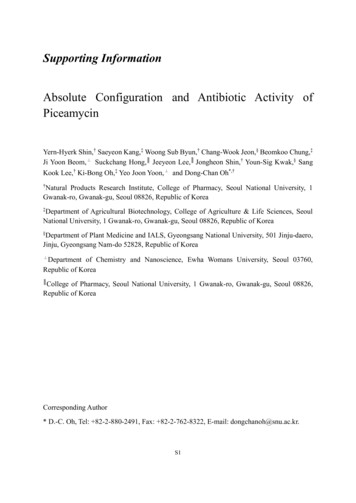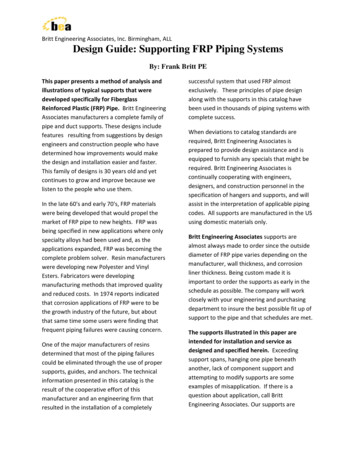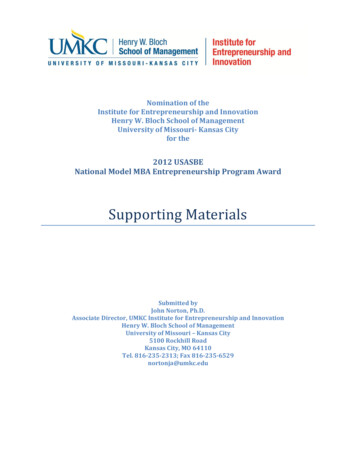
Transcription
Nomination of theInstitute for Entrepreneurship and InnovationHenry W. Bloch School of ManagementUniversity of Missouri- Kansas Cityfor the2012 USASBENational Model MBA Entrepreneurship Program AwardSupporting MaterialsSubmitted byJohn Norton, Ph.D.Associate Director, UMKC Institute for Entrepreneurship and InnovationHenry W. Bloch School of ManagementUniversity of Missouri – Kansas City5100 Rockhill RoadKansas City, MO 64110Tel. 816-235-2313; Fax 816-235-6529nortonja@umkc.edu
Supporting MaterialsContentsProgram Overview . 3Creating Entrepreneurs. 3Creating sustainable, scalable ventures . 3Innovation and innovation management . 4Experiential course content. 4Support for Award Criteria. 4Innovation. 4Course sequence. 4Interdisciplinary approach: New Venture Creation . 4Ecosystem Approach . 6Entrepreneurship Scholars Program . 7Quality . 22Faculty . 22JPIM rankings . 26Mentors . 26The Princeton Review rankings . 27Example of a course syllabus . 27Regnier Family Foundations/Bank of Blue Valley Venture Creation Challenge. 37Comprehensiveness. 39Course offerings: Core, Applications, and Tool Kits . 40Course Descriptions . 41Experiential elements . 46Sustainability . 47Administrative commitment . 47Business community engagement . 52Entrepreneur of the Year Awards . 54Noteworthy support . 56Transferability . 56Walk before you run . 56Get the business community on board. 561
Borrow what you can’t buy. 56Find champions who share your vision. 57Strategic focus . 57Absolute adherence to metrics and results. 57Affordability, modularity, and outreach . 57Depth of Support . 65Financial support . 65Community support . 65Other UMKC Mentor Programs and Resources . 78Impact . 80Impact on business education . 80Impact on the regional economy . 82Effect on mentors, donors, and other supporters . 82Impact on students’ lives . 83Entrepreneurs for life . 83Press mentions. 842
Program OverviewThese documents describe the approach, facilities, and results achieved by the UMKC Institute forEntrepreneurship and Innovation (IEI) and the Henry W. Bloch School of Management’sDepartment of Global Entrepreneurship and Innovation. The IEI designs and deliversentrepreneurship programs at all levels – undergraduate, MBA, Executive MBA, and doctorate.The Bloch School offers degrees at every level, and the entrepreneurial dimension is an importantpart of each of them. Indeed, the mission of the Bloch School, “To develop purposeful,entrepreneurial, and innovative leaders to meet changing global demands, and advance knowledgeand practice through excellent teaching, scholarship, outreach, and service,” makes explicit theunderlying belief that our students should be distinguished by a predisposition to act and anunderstanding of the activities that lead to success in innovation, whether that innovationconstitutes a new company, or a new product, division, or direction for an existing enterprise.The UMKC Bloch School MBA entrepreneurship emphasis is premised on the understanding thatconceptual teaching is a necessary but insufficient condition for our students to become successfulentrepreneurs and innovative leaders. Therefore, we surround them with support and resources—our “ecosystem”—enabling them to translate concepts into action. Those enabling resourcesinclude an accomplished and dedicated faculty; a team of local entrepreneurs who support studentsinside the classroom and outside; business leaders and investors to help them make theconnections and gather the specific resources they need; multiple venues for the presentation andcriticism of venture ideas and plans; and connections with other institutions, including schools,foundations, incubators and accelerators, businesses, and governmental and quasi-governmentalorganizations here and abroad. Resource workshops, Entrepreneurs-in-Residence, formalmentoring programs organized both by industry and by business function; a certificate program inentrepreneurship; student-run clubs and special interest groups; an Idea Fair and a VentureCreation Challenge; a student venture accelerator; a venture seed fund; and a capital accessnetwork—all of these elements constitute ways in which we ensure that good ideas and hard workwill get their best opportunity to grow.Creating EntrepreneursA student may seek to develop an understanding of entrepreneurship as an activity, become amanager of innovation in an extant firm, or create his or her own company. We regard each ofthose purposes as consistent with our mission and purpose. We want our students, whatever theydo, to think of themselves as entrepreneurs for life.Creating sustainable, scalable venturesMany of our students plan to start and operate their own firms. Although the resources required totake students from ideation to launch can be substantial, we view this activity as fundamental toour mission and to our role, not only in the university, but in the community. “Creating sustainable,scalable ventures” is a phrase we use every day.Inculcating the entrepreneurial mindsetMany of our students plan to build work experience as employees before starting a business, orwish to be employees within an organization, rather than entrepreneurs per se. However, we stillseek to build within each of our students the “can-do” attitude and initiative of the entrepreneur.3
Indeed, students can differentiate themselves in the marketplace with an entrepreneurshipemphasis that marks them as particularly valuable employees.Innovation and innovation managementBecause of the strength of our innovation management faculty, we also provide for those studentswhose interest is in developing the tools and techniques required to create new products, services,and concepts, and to take them to market successfully.Experiential course contentEvery conceptual teaching point is underscored in our courses with experiential elements.Students often use those experiential components to further their own entrepreneurial endeavors.Support for Award CriteriaThe following subsections provide materials in support of the seven award criteria established byUSASBE.InnovationAs evidence of innovative approaches to fulfilling our mission, given our unique position,capabilities, limitations, and goals, we wish to draw attention to the following: Course sequencing;;an interdisciplinary approach, exemplified by a “New Venture Creation” course developed byfaculty from the Law, Engineering and Computer Science, and Business schools; our “ecosystem”approach to venture support; and our Entrepreneurship Scholars program, fully integrated into theMBA program, with its focus on sustainable, scalable ventures, its experiential nature, its uniquelyrich set of interactions with the professional community, and the array of features designed toassure access to required resources. As you will see in the later section under “Impact,” theprogram isn’t just innovative, it is effective.Course sequenceFor students interested in launching a venture, a strict sequence of courses takes them throughideation, planning a business, and running a business, guiding students step-by-step through alogical process culminating in the launch and operation an enterprise. As an example of thepractical, experiential approach we take, the Entrepreneurial Finance course is co-taught by afaculty member and an investor. Students make investments in ventures formed by the venturecreation class. The investments are modest amounts of real money—on the order of 500 to 1000—and the venture creation students make their pitch to the entrepreneurial investmentsstudents, explaining why they deserve the investment, how they will use it, and how, when, andhow much it will profit the investor. The primary purposes are learning how to make and evaluatea pitch, but those student ventures that do earn profit can use it to pay the investment back into thefund.Interdisciplinary approach: New Venture CreationAbbreviated Description of the CourseWhile the centerpiece of the ENVC course is the development of a business plan for thecommercialization of a high-tech product or service, through lectures, student presentations, a midterm examination and several individual and team writing assignments, the course curriculumoffers a multi-faceted, integrated program of acquiring and applying knowledge of entrepreneurial4
principles and problem-solving and team-building skills. As experiential learning in team dynamicsis one of the primary goals, the instructors require the student teams to resolve a variety of issues,such as assigning responsibilities, and setting timelines and measuring and managing progressagainst project plans in order to complete their business agenda and related business planpresentation materials in a challenging timeframe.Each student’s overall course grade is based in equal parts on the student’s individual and teamperformance. The in-class mid-term examination counts for thirty percent of the course grade andcovers a variety of topics taught early in the semester that form predicates for the development of asuccessful business plan. Class participation makes up twenty percent of the “individual” grade andincludes: (a) attendance (b) the quality of work on homework and presentations assigned asindividual-by-individual projects, (c) the quality of the student’s participation in classroomdiscussions, and (d) an assessment by other team members of the student’s work on team projects.The remaining fifty percent of the course grade, based on team deliverables, consists of the team’swork on written materials and oral presentations (10%); a mock presentation to prepare for theCompetition (15%); the written business plan (20%); and the team’s exhibit booth at theCompetition (5%).Unique Aspects of the CourseThe ENVC course is a unique, interdisciplinary mix of classroom teaching, clinical or experientiallearning, and competition that serves to educate students and start business ventures. Theseinnovative approaches prompted the UMKC Faculty Senate to feature this course in a presentationto the University of Missouri Curators in June of 2009. The course is successful because of a seriesof critical partnerships among the IEI and several academic schools. The first critical collaborationin the evolution of the course was between Prof. Tony Luppino of the UMKC Law School (now also aTeaching Fellow with the IEI) and Dr. Walter Rychlewski, who is affiliated with both UMKC’s Schoolof Computing & Engineering and UMKC’s Henry W. Bloch School of Management. Both of thosecourse designers held 2004-2005 appointments in the Ewing Marion Kauffman Foundation’sEntrepreneurial Faculty Scholars Program, which was formally launched at the USASBE annualconference in January of 2004. After extensively researching initiatives in interdisciplinaryentrepreneurship education, and finding few examples of truly interdisciplinary courses—i.e.,courses with faculty and students from multiple disciplines regularly involved in all significantcourse activities—with real-world technology projects at their core, they restructured a course intechnology entrepreneurship previously taught by Dr. Rychlewski to solely engineering students.The resulting multi-disciplinary course design was promptly embraced by the IEI, a leadinginstitute for entrepreneurship, research, teaching, and programs for transformationalentrepreneurship education and experiential learning, and actively supported by its ExecutiveDirector, Dr. Michael Song, Charles N. Kimball, MRI/Missouri Endowed Chair in Management ofTechnology and Innovation & Professor of Marketing, a world-renowned innovation andtechnology management scholar. The IEI provided additional faculty support when Dr. Dirk Libaersco-instructed the course in 2007 and 2008, and most recently when Dr. Mark Parry, Ewing MarionKauffman/Missouri Endowed Chair in Entrepreneurial Leadership & Professor of Marketing, joinedProf. Luppino as a course co-instructor. With the latest refinements of the course createdcollaboratively by Professors Luppino, Parry, and Rychlewski, the ENVC course incorporatesseveral elements of innovative pedagogy, including, among others:5
Opportunities for students from various disciplines to make presentations to the entireclass on subjects “in their wheelhouse” (e.g., MBA students on analysis of industries,markets, competition, pricing, and forecasting; engineering students on how the technologyin question works and project planning as an art; and law students on a variety of legal andregulatory issues confronted by entrepreneurial ventures).Consultation between student teams from an IEI Venture Finance class and the ENVC courseas they work on projections for their business plan.Attendance by students from a companion course taught to engineering students by Dr.Rychlewski in the classroom adjacent to the ENVC course classroom in many lectures andpresentations in the ENVC course, and participation by Dr. Rychlewski, along with Prof.Luppino and Dr. Parry, in class discussion during those sessions.The syllabus for this course is included in this document for your examination.Ecosystem ApproachWhile the use of the term “ecosystem” of support for student entrepreneurs is widespread, it meansdifferent things in different contexts, so we include this section to articulate more precisely theposition our MBA entrepreneurship emphasis plays within the Bloch School and the resourceelements that enable it to fulfill its mission.FacultyAs we will discuss further below, the Bloch School has made the significant commitment ofestablishing a Department of Global Entrepreneurship and Innovation, with 13 tenure lines,including three endowed chairs. The faculty hired thus far are remarkably productive, and in facthave earned for the University of Missouri-Kansas City
entrepreneurship programs at all levels – undergraduate, MBA, Executive MBA, and doctorate. The Bloch School offers degrees at every level, and the entrepreneurial dimension is an important part of each of them. Indeed,


